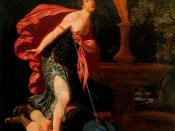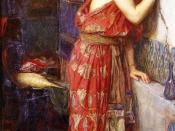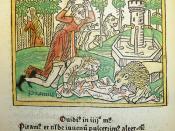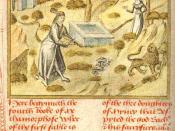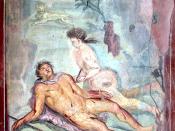In this essay I shall be looking at how humour in the final scene adds to the dramatic impact of the play.
First I will look at why the play was written.
?A midsummer night's dream? was written specifically for a wedding of two important people. Even more important was the fact that queen Elizabeth I would be attending. Being a wedding ceremony, something cheerful and light headed was needed, so Shakespeare chose to write a love story, set in summertime, as winter suggests dullness and sadness. It is referred in the title, and also in the story, as being a dream, which gives the story a mystical and magical element. The play has comedy in it throughout, with all the confusions of the love potions, however, the main element of comedy is provided by the mechanicals, who are a contrast to the rest of the high-class people in the play.
Bottom is the stupidest of the lot of them, and are a contrast to the rest of the high-class people in the play. Bottom is the stupidest of the lot of them, and throughout it, we laugh at his stupidity as he thinks he is so great.
The last scene is divided in to three parts: firstly where Theseus wishes the lovers well and finds out what entertainment there is ?to ease the anguish of a torturing hour?; the mechanicals' play, where most of the humour lies, and finally Puck's speech and Titania's blessing.
The scene begins with Theseus making a long, formal speech after hearing the events of the lovers. At this point the mood is quite serious, so it is a contrast when the humour begins.
The first bit of humour is when theseus reads out the list of entertainment, dismissing all but the mechanicals' play, which is described as ?a tedious brief scene? very tragical mirth,? which, of course to the audience, sounds ridiculous, though the mechanicals would have thought it sound intelligent. Although Philostrate advises against it, Theseus wishes to see this play.
Quince then enters with the prologue; a grand entrance, which prepares us for a speech to match, however, it turns out he is a terrible actor, and the speech contains words which he clearly does not know the meaning of. ?If we offend, it is with our good will?; ?We come but in despite?, - clearly not meaning that at all, providing verbal humour, what he is saying is that they've not come to entertain them at all, but to spite and to offend them. Hippolyta makes a snide remark, comparing him to a recorder, making sounds, but nothing to make sense of.
Quince continues with the prologue, introducing ?This beauteous lady Thisbe?, who is actually Flute, who earlier complained that he had a beard coming. This would then look ridiculous as he is playing a beautiful Lady. Also entering is ?Lion? and ?Moonshine? who would look just as ridiculous. The prologue is filed with rhyming and alliteration, which of course sounds overdone and stupid: ?He bravely broach'd his boiling bloody breast? The audience at the wedding add to the mechanicals' humour by commenting on the play, and makes us see just how terrible it is.
Demetrius makes a funny remark about the actors, ?No wonder one lion may [speak] when many asses do?, obviously making fun of them.
Also visually funny is the snout dressed up as a wall, which becomes even more funny when he introduces himself as wall. Demetrius makes a pun about it: ?It is the wittiest partition that ever I heard? Pyramus then enters for the first time, of course, completely over acting his part. The first sentence, ?O grim-look'd nigh? O night with hue so black! O light, which ever art when day is not!? sounds so stupid as he is stating the obvious. His speech is overdone with him crying, ?O? so many times.
This part is funny because we see how terrible an actor he is, yet he thinks he is so great and witty.
He then goes on to address the wall directly, which only emphasises that the ?wall? is just a man with a terrible costume.
When Theseus notices this and suggests that the wall should curse back, Pyramus does the worst thing an actor can do: he steps out of roll and corrects him on what is to happen in the play. This is typical of him as he always want to show off and be involved, and we cringe for him.
It gets worse when Thisbe enters and Pyramus says, ?I see a voice: now will I to the the chink, To spy and I can hear my Thisbe's face?, getting his words mixed up as usual (malapropism), and that continues throughout the dialogue of Pyramus and Thisbe; Limander instead of Leander; Ninny instead of Ninus's tomb. Even more stupid is when ?wall2 makes a leaving speech.
Hippolyta clearly has no tolerance for their stupidity, and is very blunt about them.
?This is the silliiest stuff that ever I heard? However, Theseus is more sympathetic towards them, but he tells her to use her imagination to make them seem good, and if they see them as good as they see themselves, they can pass as being good actors. This also reminds us that the actors truly think that they can act well.
Lion then enters and tell everyone that he is not actually Lion, but Snug the Joiner. This would sound ridiculous as clearly he is not; being a terrible, and stepping out of roll to talk to the audience.
While Theseus tries to be nice about him - ?A very gentle beast, of a good conscience?, Demetrius says that he is best at playing a beast.
The next visual humour is ?moonshine? - a man carrying a lantern.
As he begins his speech as ?Moonshine? - ?This lantern doth the horned moon present?, Demetrius makes a very funny comment, ?He should have worn the horns on his head?, calling him cuckold, as they were said to have horns on their heads. They continue to criticise him until Lysander says, ?Proceed, moon? However, there is more visual humour when he says that the lantern is the moon, he is the man in the moon, and ?this thorn-bush, my thorn-bush; and this dog, my dog?, which would sound stupid.
The next part is very funny as Thisbe enters and gets chased by Lion. This scene would have been intended to be dramatic but would look stupid as Snug is so thinly disguised, it would just look comical.
The audience then all make sarcastic comments ?Well roared Lion? ?Well shone, Moon. Truly, the moon shines with a good grace.? Theseus then says, ?Well moused, Lion?: comparing the scene to a cat catching a mouse. As a contrast to the impatient and bored actors, Pyramus then delivers another speech, again trying to have an impact on the audience, but fails, because of the poor quality of the words and acting: ?O dainty duck! O dear!? over acted and with little impact. Just as bad is Thisbe's speech and death, which is just as dry.
Again Theseus and Demetrius mock the actors, ?Moonshine and Lion are left to bury the dead.? Bottom then asks them if they want to hear the epilogue, which, of course is a joke considering they all couldn't wait for it to finish. Theseus then begins to speak in more formal language, which ends the comedy and light tone of the play, which leads on to Puck's speech and the fairies' blessing, which concludes the play.
The above points show that while the final scene is not directly connected to main plot of the play, it is highly significant in the way it provides contrast and humour which draws together the main elements in the play. It would have been a very appropriate ending for the situation in which it would be performed - humour and a blessing for both the characters and the bride and groom in the audience.

